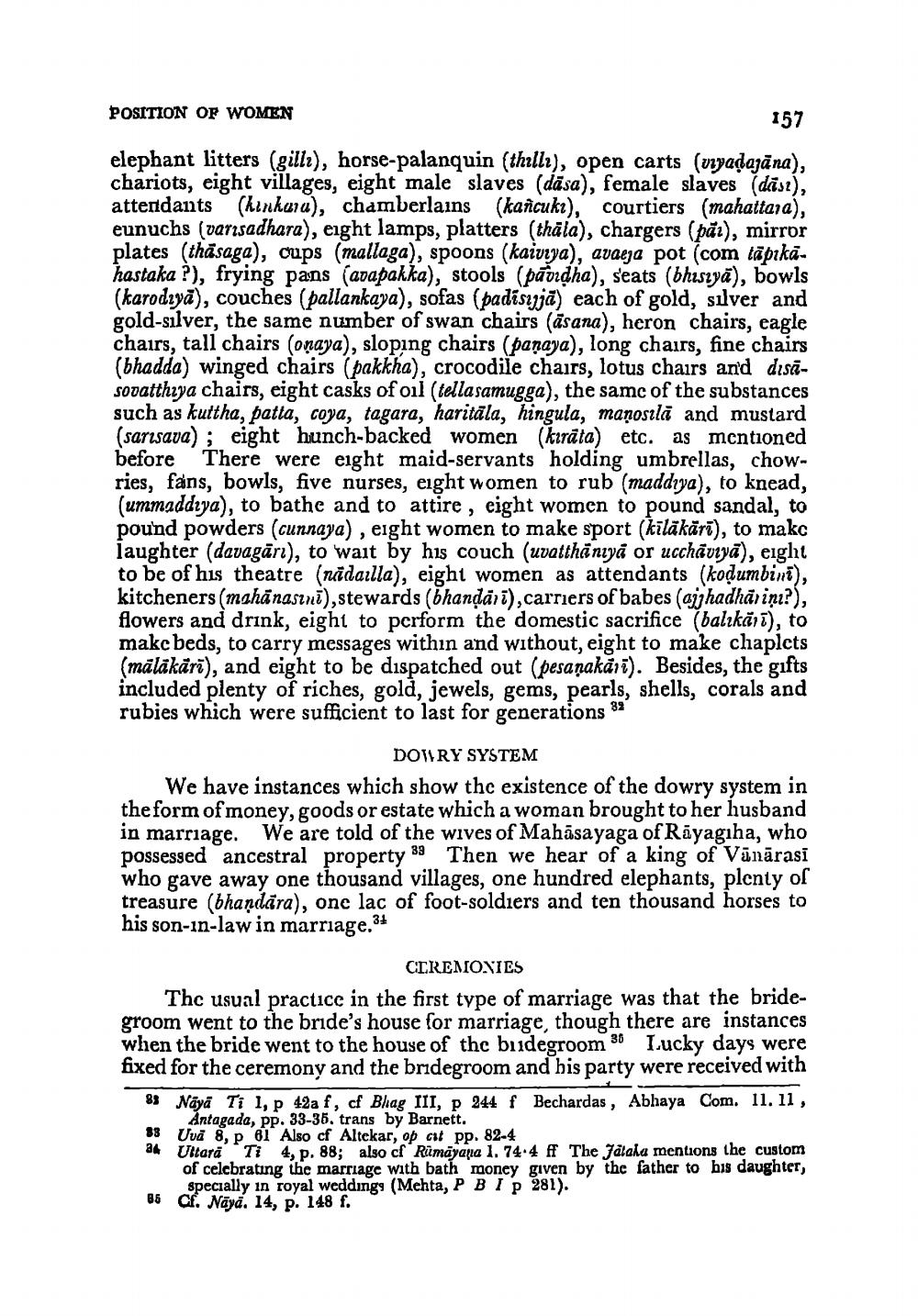________________
POSITION OF WOMEN
157
elephant litters (gille), horse-palanquin (thellz), open carts (viyadajāna), chariots, eight villages, eight male slaves (dāsa), female slaves (dāsı), attendants (kinkura), chamberlains (kañcuki), courtiers (mahattara), eunuchs (varisadhara), eight lamps, platters (thäla), chargers (pāı), mirror plates (thāsaga), cups (mallaga), spoons (kaiviya), avaeja pot (com täpikā. hastaka ?), frying pans (avapakka), stools (pāvdha), seats (bhisiyā), bowls (karodzyā), couches (pallankaya), sofas (padísijā) each of gold, silver and gold-silver, the same number of swan chairs (asana), heron chairs, eagle chairs, tall chairs (onaya), sloping chairs (panaya), long chairs, fine chairs (bhadda) winged chairs (pakkha), crocodile chairs, lotus chairs and disasovatthiya chairs, eight casks of oil (tellasamugga), the samc of the substances such as kuttha, patta, coya, tagara, haritāla, hingula, maņosilā and mustard (sarısava) ; eight hunch-backed women (kırāta) etc. as mentioned before There were eight maid-servants holding umbrellas, chowries, fans, bowls, five nurses, eight women to rub (maddiya), to knead, (ummaddiya), to bathe and to attire, eight women to pound sandal, to pound powders (cunnaya), eight women to make sport (kīlākārī), to makc laughter (davagāri), to wait by his couch (uvatthāniyā or ucсhāviyā), eight to be of his theatre (nidaılla), eight women as attendants (kodumbini), kitcheners (mahānasınī), stewards (bhandārī),carriers of babes (ajihadhārini?), flowers and drink, eight to perform the domestic sacrifice (balıkārī), to makc beds, to carry messages within and without, eight to make chaplets (mālākārī), and eight to be dispatched out (pesanakari). Besides, the gifts included plenty of riches, gold, jewels, gems, pearls, shells, corals and rubies which were sufficient to last for generations 33
DOTIRY SYSTEM We have instances which show the existence of the dowry system in the form of money, goods or estate which a woman brought to her husband in marriage. We are told of the wives of Mahāsayaga of Rāyagiha, who possessed ancestral property 33 Then we hear of a king of Vānārasī who gave away one thousand villages, one hundred elephants, plenty of treasure (bhaņdāra), one lac of foot-soldiers and ten thousand horses to his son-in-law in marriage.34
CEREMONIES The usual practice in the first type of marriage was that the bridegroom went to the bride's house for marriage, though there are instances when the bride went to the house of the bridegroom 36 Lucky days were fixed for the ceremony and the bridegroom and his party were received with 88 Naya Ti 1, p 42a f, cf Bhag III, p 244 f Bechardas, Abhaya Com. 11. 11,
Antagada, pp. 33-35. trans by Barnett. 33 Uvā 8, p 61 Also cf Altekar, op at pp. 82-4
Ultară Ti 4, p. 88; also cf Rumāyana 1. 74.4 ff The Jalala mentions the custom of celebrating the marriage with bath money given by the father to his daughter,
specially in royal weddings (Mehta, P BIP 281). 86 af. Nāya. 14, p. 148 f.




